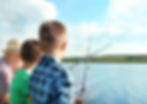Why fishing is important for your Autistic child
- Autism & Beyond
- Sep 1, 2023
- 4 min read
Something you probably know about me already is that I absolutely love fishing and would fish any chance I get.
Something you probably don’t know about me was, growing up, I also loved computer games and technology (90’s tech) . I would spend hours on end playing my computer games and the only reason I would stop playing them was because I wanted to go fishing! I can see a lot of similarities between myself and a lot of the kids I work with. In hindsight fishing actually taught me many life skills and is part of the reason why we now include fishing as one of our programs.

If you have never considered taking your child fishing here are 8 potential benefits from doing so:
Sensory Engagement: A Multi-Sensory Journey
Fishing opens up a world of sensory engagement for autistic children. The gentle touch of water, the diverse textures of bait and fish, and the soothing sounds of nature create an immersive experience. Through these sensory encounters, fishing offers a unique platform for autistic children to regulate their sensitivities and develop a richer understanding of the world around them.
Routine and Predictability: Finding Comfort in Structure
The structured routine of fishing can be a comforting anchor for autistic children who thrive on predictability. The step-by-step process of preparing equipment, casting lines, and waiting patiently for a bite offers a reliable sequence. This predictability can provide a sense of security and stability, contributing to a positive fishing experience.
Focused Attention: Nurturing Concentration
Fishing naturally demands focused attention, making it an ideal activity for autistic children. The engagement required to monitor the fishing line and anticipate movements fosters improved concentration and attention span. This focused engagement can be particularly beneficial for children dealing with challenges related to attention.

Social Interaction: Bridges to Connection
Fishing extends an invitation for both solitary reflection and social interaction. Autistic children can seize the chance to interact with family, friends, or fellow anglers during a fishing expedition. Engaging in relaxed conversations about fishing topics offers a comfortable setting for practicing social skills, allowing for gradual growth in social interactions.
Patience and Coping Skills: Lessons in Resilience
The virtue of patience finds its home in fishing, where waiting for a fish to bite becomes a valuable lesson. Autistic children can learn impulse control, patience, and coping mechanisms to navigate frustration when instant results are elusive. These skills, acquired through fishing, can be transferred to various life situations.

Connection with Nature: Nurturing Tranquility
The embrace of nature is a remarkable gift of fishing. For autistic children, the tranquil outdoor setting becomes a sanctuary. Amidst the serene surroundings, fishing trips provide an ideal backdrop for relaxation and emotional regulation, offering respite from the demands of daily life.
Non-Verbal Communication: Expressions Beyond Words
Fishing introduces the realm of non-verbal communication, where the subtleties of a fishing line's behavior or the water's movements convey messages. This dimension holds significance for autistic children who may face challenges with verbal communication. These non-verbal cues provide an avenue for self-expression and connecting with others.
Skill Development: Nurturing Growth and Confidence
Fishing serves as a fertile ground for skill development, instilling a sense of achievement in autistic children. Learning fishing techniques and strategies becomes a rewarding endeavor, elevating self-esteem and fostering a profound sense of accomplishment.

My Top Tips for Aspiring Anglers
As you embark on your fishing journey, consider these tips:
-A rod weighted 2-4kgs is perfect. Start with a simple combo from your local tackle shop such as BCF
- Opt for smaller hooks; they snag big catches without trouble, but oversized hooks struggle with small fish.
- Choose a lighter line, like 6lb, which is suitable for most estuary species.
- Employ the smallest sinker feasible within the current's allowance. While hefty sinkers may cast bait far, subtlety attracts more fish.
- Master your knots; dependable knots ensure that prized fish don't slip away.
- Don't hesitate to seek guidance from tackle stores or online tutorials. Embrace the wisdom of experienced anglers to enhance your fishing prowess.
Have fun fishing, see you out there!
Clint
Disclaimer:
This disclaimer governs your use of Autism & Beyond website and blog. By using this website, you accept this disclaimer in full. If you disagree with any part of this disclaimer, do not use this blog, this website or any affiliated websites, properties, or companies. We reserve the right to modify these terms at any time. You should therefore check back periodically for changes. By using this website after we post any changes, you agree to accept those changes, whether or not you have reviewed them.
All information and resources found here are based on the opinions of the author unless otherwise noted. All information is intended to motivate readers to make their own nutrition and health decisions after consulting with their health care provider. I am not a doctor, lawyer, psychiatrist, therapist, or your mother, and I don’t play one on the internet.
The author of this site encourages you to consult a doctor before making any health changes, especially any changes related to a specific diagnosis or condition. No information on this site should be relied upon to determine diet, make a medical diagnosis, or determine treatment for a medical condition. The information on this website is not intended to replace a one-on-one relationship with a qualified health care professional and is not intended as medical advice.
NO information on this site should be used to diagnose, treat, prevent or cure any disease or condition.
None of the posts and articles by Autism & Beyond may be re-printed without express written permission of the author. Autism & Beyond will respond to written requests to re-print parts of posts and excerpts/quotes (10% or less) may be reprinted with attribution as long as all links are left intact.





